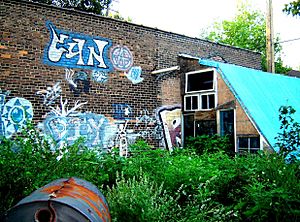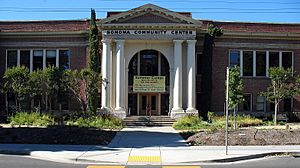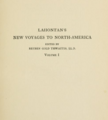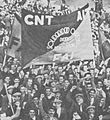Anarchist communism facts for kids

Anarcho-communism (also called anarchist communism or libertarian communism) is a way of thinking about how society could be organized. It's a type of anarchism that suggests we could live without a government (or "state"), without capitalism (a system where businesses are privately owned for profit), and without wage labour (working for a salary).
Instead of private ownership of big things like factories or land, anarcho-communists believe these should be owned by everyone together. This is called collective ownership. They still respect personal property, like your toothbrush or your clothes.
The main idea is: "From each according to his ability, to each according to his needs". This means people would contribute what they can, and everyone would get what they need. Many anarcho-communists believe this way of living helps individuals and society work well together.
This idea started to grow after the French Revolution. It was first clearly explained in Italy, within a group called the First International.
Real-Life Examples
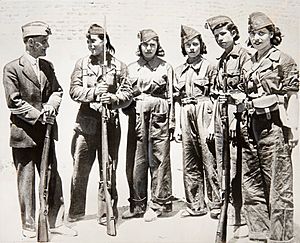
Some of the most famous examples of anarcho-communist ideas in action happened during the Spanish Revolution of 1936. In parts of Spain, people tried to set up societies based on these ideas.
Another example was the Free Territory during the Russian Revolution. Here, anarchists like Nestor Makhno worked to create and protect anarcho-communist ways of life. This lasted from 1919 until 1921, when it was taken over by the Bolsheviks.
Today, there are smaller examples. One is Trumbullplex, an urban community in Detroit, Michigan. It helps people by providing housing and a place to live without the burden of rent. This allows people to escape economic worries and join a democratic commune.
Trumbullplex is a place for young people to gather and for everyone to work together and make decisions. It's often filled with punk rock music, parties, and celebrations. It has been around since 1993. Its main goal is to be a place where people help each other (mutual aid) and where no one is in charge of others (no hierarchy).
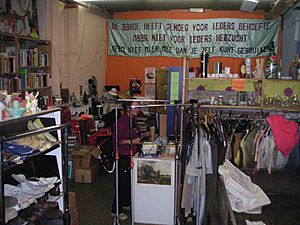
There are also Give-away shops, sometimes called free shops or free stores. These are places where everything is free! They are like charity shops, often with second-hand items, but you don't pay anything. Whether it's a book, furniture, clothes, or a household item, it's all given away freely. Some even work as swap shops.
In the 1960s, a group called The Diggers, part of the counterculture movement, opened free stores. They gave away food, medical supplies, money, and even organized free music concerts.
The Diggers wanted to create a small society without money or capitalism. While free stores have been around in the United States since the 1960s, the Freegan movement has helped create even more. Today, new generations of social centers, anarchists, and environmentalists keep this idea alive. They see it as a way to make people think about consumer culture and encourage the reuse of products.
Images for kids
-
The Diggers are often seen as the first practicing anarchists, having held common ownership over land and resources around the time of the English Civil War
-
Lahontan's 1703 novel explored various societies where everyone shared property through collective ownership. These cultures often had no leaders and practiced mutual aid.
-
Carlo Cafiero, one of the first to support anarchy and communism
-
Luigi Galleani, an important anarchist who supported insurrectionary anarchism
-
The Korean People's Association in Manchuria, a Korean anarchist society that existed without markets, based on mutual aid and gift economics
-
Anarchists during the Spanish Revolution of 1936
-
An anti-fascist poster from the libertarian socialist groups of Madrid, Spain, warning against Nationalist terrorism
-
The Conquest of Bread by Peter Kropotkin, an important book about the economic ideas of anarcho-communism
-
Watercolor by James G. Swan showing the Klallam people of chief Chetzemoka at Port Townsend, with one of Chetzemoka's wives giving out potlatch gifts
-
Alexander Berkman believed that profit should be replaced with communities where everyone shared possessions.
-
Student anarchists protesting against the IMF
See also
 In Spanish: Anarcocomunismo para niños
In Spanish: Anarcocomunismo para niños


